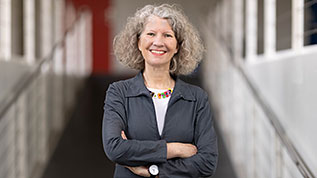We Celebrate Our 50th Birthday!

50th Anniversary of BiB
At the end of the 1960s, a development took place in Germany that still strongly shapes our population structure today: Birth rates declined massively - fewer children were born, more and more people remained childless. What were the causes and what were the consequences? Answering these questions was once the impetus for founding the Federal Institute for Population Research (BiB).
This year, the Federal Institute for Population Research (BiB) celebrates its 50th anniversary. Since 1973, we have been researching the diverse causes and consequences of demographic change in Germany and beyond. On this science-based foundation, we advise policymakers and inform the public.
The BiB yesterday, today and tomorrow
In an interview regarding the 50th anniversary Director Prof. Dr. C. Katharina Spieß sums up the activities of the institute in the last 50 years, talks about current research and gives an outlook on future trends and focal points.
The anniversary issue of „Bevölkerungsforschung Aktuell“, looks at the development of the institute. In addition to greetings from the Federal Minister of the Interior and Community, Nancy Faeser, and the Chairman of the Board of Trustees of the BiB, Prof. Dr. Marcel Thum, an article in the issue highlights the development of research work in recent decades and describes the changes. A timeline provides facts of population trends and developments over the last 50 years and relates them to the BiB.
Joint Anniversary Week: Official Ceremony and Destatis-BiB Symposium
The BiB anniversary was the occasion for our celebration week from 3 to 6 July 2023 in Wiesbaden. Two of the events were organised together with the Federal Statistical Office of Germany (Destatis), which celebrates its 75th anniversary this year.
The official ceremony on 5 July was the kick off of our joint anniversary week in Wiesbaden. We were pleased to welcome, among others, Dr Markus Richter, State Secretary at the Federal Ministry of the Interior and Community and Federal Government Commissioner for Information Technology, Mathias Cormann, OECD Secretary General, Gert-Uwe Mende, Lord Mayor (Wiesbaden) and Prof. Dr. Armin Grunwald, member of the German Ethics Council. The Destatis-BiB symposium „Daten.Forschung.Zukunft“ followed on 6 July 2023.
Scientific Conference: “Frontiers in Policy Relevant Population Research”
In addition, the BiB organised an international conference entitled “Frontiers in Policy Relevant Population Research” from 3 to 5 July, also in Wiesbaden. The conference was organised around three strands reflecting central themes in population research:
Programme
Further information and the programme of the conference can be found here.
Download: Overview of the BiB anniversary week (pdf, 1MB)

C. Katharina Spieß, Director of the Institute:
“I have been director of the Federal Institute for Population Research (BiB) since October 2021. It is really nice that in my second year as director I could host such an exciting event with the team at BiB. I have been delighted to celebrate with many international and national researchers in Wiesbaden this year.”

Sebastian Klüsener, Head of Research Area
Ageing, Mortality and Population Dynamics:
“Many interesting scientific contributions were submitted for our international conference. I especially enjoyed the interactive parts of the conference, where we took a look at how scientific findings can be even better incorporated into policy!”
Organising Committee
Laura Brockschmidt, Anna Dechant, Lena Frembs, Pavel Grigoriev, Yvonne Halfar, Sebastian Klüsener, Jana Knechtges, Elisabeth Kraus, Emily Lines, Detlev Lück, Regina Otto, Katja Patzwaldt, Markus Sauerberg, Nils Witte
Funded by:
|
|
|



